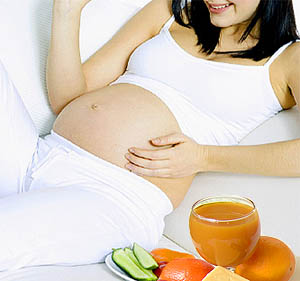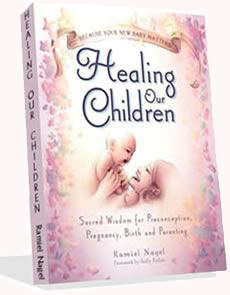 Many women are familiar with the standard recommendations made during pregnancy such as taking prenatal vitamins, getting plenty of rest, avoiding fish high in mercury, etc. These recommendations help to ensure a healthy baby but they are are unhelpful, since prenatal vitamins and avoiding mercury in fish are detrimental in general. What most women don’t realize is that pre-pregnancy nutrition is just as important to a child’s health and subsequent development as the nutrition she receives during gestation. This article will highlight the crucial function of saturated fat and its role in keeping women (and their future children) healthy and vibrant.
Many women are familiar with the standard recommendations made during pregnancy such as taking prenatal vitamins, getting plenty of rest, avoiding fish high in mercury, etc. These recommendations help to ensure a healthy baby but they are are unhelpful, since prenatal vitamins and avoiding mercury in fish are detrimental in general. What most women don’t realize is that pre-pregnancy nutrition is just as important to a child’s health and subsequent development as the nutrition she receives during gestation. This article will highlight the crucial function of saturated fat and its role in keeping women (and their future children) healthy and vibrant.
Condition your body before the main event
Before you actually become pregnant, it’s important to make sure that your body is in optimum shape to carry a child; this is often an overlooked component of a healthy pregnancy. If you wanted to run a marathon, would you attempt to train on the day of the big event? Of course you wouldn’t. You would condition and prepare your body for the race several months before you actually ran. Think of pregnancy as the marathon and the pre-race training and conditioning as pre-conception nutrition.
Savor the fats – your brain and hormones will thank you
We often hear that “good fats,” such as Omega 3, are an essential part of our diet. These fats reduce inflammation, are largely monounsaturated and come from sources such as avocados, oily fish and olive oil. Pregnant women should not be encouraged to eat olive oil or avocados, though it is fine to eat those fats. However, more important are healthy sources of saturated fats. Although items like real butter, whole fat dairy and animal fat are largely shunned and vilified by mainstream doctors, these items will prove to be incredibly valuable for you and your future child’s health.
Saturated fats are part of the building blocks for healthy hormone production and function. Infertility has become a modern day epidemic with more and more women struggling to conceive at younger ages; the source of this problem for many women begins in their teens. More and more young women in their teens and early twenties frequently experience irregular periods, and instead of investigating the root of the problem, many doctors casually recommend the pill as a solution. The truth is these young women don’t need the pill – they need more fat.
Hormones, such as estrogen and progesterone (two of the main hormones involved in menstruation and ovulation) are made from cholesterol. Without sufficient amounts of cholesterol, your body will not make enough hormones, resulting in skipped periods or periods without ovulating. Contrary to popular belief, cholesterol should not be feared, as it’s actually an antioxidant that protects and repairs your organs from damage.
Fats are also important for your brain health and mood regulation. Cholesterol maintains the health of neurotransmitters, such as serotonin – “the feel good hormone.” In addition to cholesterol, a diet rich in vitamin D is wonderful for elevating your mood. Animal sources of fat, such as fermented cod liver oil, raw butter and dairy, are rich in vitamin D. So if you’re feeling a little blue or you are experiencing PMS, instead of loading up on chocolate, you may want to raise your fat intake to help “turn your frown upside down.”
Balanced hormones are not the only advantages of eating fats. Fats also help you to absorb vitamins such as vitamins A and D, essential vitamins for fetal development. Vitamins A and D pre-pregnancy are also responsible for healthy skin, vision and calcium absorption. Fears concerning vitamin A in pregnancy are largely unfounded, provided the vitamin A comes from nutrient dense food. Large amounts of the synthetic form of vitamin A – an ingredient in most standard prenatal vitamins – is what you should be concerned about. Large amounts of synthetic vitamin A can cause birth defects. Low levels of vitamin A in pregnancy can cause improper fetal development of the heart, lungs, kidneys, eyes, bones, circulatory, respiratory and central nervous systems. Low vitamin A can also impair the immune system and fat metabolism.
Low levels of vitamin D increase the chances for preeclampsia, a pregnancy condition caused by high blood pressure. It is crucial to build your stores of both vitamins A and D before you become pregnant to further reduce these risks.
Therefore, to get vitamin D from a natural source, use FERMENTED COD LIVER OIL. You can buy it at www.codliveroilshop.com
Consuming healthy fats helps to stabilize blood sugar levels by minimizing sugar cravings (which plague pregnant women). Fat keeps you fuller for longer, which keeps blood sugar levels stable. During pregnancy, healthy blood sugar levels help to lower the risk of gestational diabetes.
Healthy sources of fat from a wide spectrum including pastured butter, eggs and meats, whole fat dairy and animal fats such as tallow and lard are essential for reproductive health.
It is best to build your body using nutrient dense foods several months to a year before pregnancy. From a physiological standpoint, carrying a child depletes a woman’s nutritional reserves in its attempt to supply the growing child with nutrition. Realistically, trying to increase your nutrition once your pregnant is a reactive approach; how can you possibly build up healthy levels of nutrients in your body and supply your growing child with these nutrients at the same time? If your own nutritional stores are intact prior to your pregnancy not only will your baby be healthy, but you will be healthy as well. After all, a truly healthy pregnancy involves not just one, but two.












